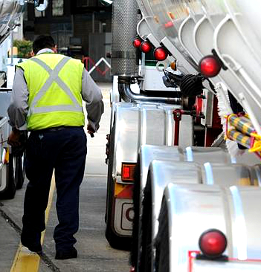Cootes chooses to pull over in Victoria
 Cootes Transport has made a voluntary decision to take its entire Victorian fleet off the road, as safety concerns continue.
Cootes Transport has made a voluntary decision to take its entire Victorian fleet off the road, as safety concerns continue.
Several authorities have been called in since a crash that left two dead in October last year, with the latest probe into Cootes’ trucks again uncovering safety defects.
The most recent findings came from a VicRoads sweep of Cootes Transport vehicles which found faults including defective brakes and air bags, loose bolts, oil leaks and other safety problems.
Victoria's Roads Minister Terry Mulder said the findings were extremely disconcerting, and that it was unacceptable for defective trucks to be on public roads, often carrying dangerous materials.
“VicRoads will continue to target companies who break the law,” Mulder said.
“This is extremely disappointing given these companies are carrying placarded loads; that is, they're carrying gas and they're carrying petrol and the worst possible combination would be for those particular products to be hauled around our state in an unroadworthy vehicle.”
The Victorian authority’s statements match those of NSW Roads Minister Duncan Gay after his state’s safety sweep. Mr Gay said that “systemic negligence” continues to plague Cootes Transport.
The ongoing concerns have forced McAleese Group, which owns Cootes Transport, to start negotiations addressing the issues with state and federal regulators.
McAleese sought a suspension from trading on Monday, with many waiting to see how the safety issues will hurt future forecasts and the restructuring of the firm.
“We are working closely with regulators to address issues within the fleet while maintaining supply of essential services across the country,” a company spokesperson said in an interview over the weekend.
“Regulators have been fully briefed on the steps being taken by McAleese to remedy any issues which include the appointment of independent safety experts, voluntary inspections and a significant investment in new vehicles.”
Despite its well tarnished safety record, Cootes still enjoys several of the advantages of signing up to the national safety accreditation scheme. The scheme means the company can roster drivers for 14-hour shifts and get a larger mass allowance for its trucks.
The chief executive of the national trucking regulator for the National Heavy Vehicle Accreditation Scheme says Cootes’ safety accreditation will remain valid.
The trucks ‘'will be eligible to carry extra weight”, National Heavy Vehicle Regulator chief executive Richard Hancock said, if they can meet “prescribed management standards” and undergo extra audits.
Mr Hancock also added; “an operator that is accredited under the NHVAS [National Heavy Vehicle Accreditation Scheme] Basic Fatigue Management is permitted to allow selected drivers to work for a maximum of 14 hours in any 24-hour period, rather than the 12-hour limit that would otherwise apply.”








 Print
Print